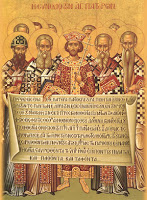
In Book 7 of his
History of the Church, Eusebius discusses several figures whom he regarded as heretics, among them Paul of Samosata, Sabellius, and Novatian (whom he calls Novatus). Do you agree with Eusebius' evaluation of these men? Are they truly heretics? If so, is false doctrine the central problem, or does something else seem to be involved? What techniques does the church seem to be using in dealing with the divisions caused by such men? Does the "surgery" in each case seem successful or not?
Paul of Samosata was not a very nice guy. I believe, like the people of this time believed, that this Paul was in fact a heretic. He taught a lot of false doctrine and became very rich through manipulation and blackmail. These are all signs of a heretic and really rotten dude. He was supposed to be a church leader, but instead he used his powers for evil rather than good.
ReplyDeleteI am glad that he was successfully excommunicated, I believe that this was a successful and much needed way to get rid of such a person.
Kent Johnsen
ReplyDeleteIt seems clear that Novation is a heretic based on rejection of baptism and what he says about Jesus, among others. It was evident that the Church had to get him handled immediately. Along with this, Paul of Samosata started his own spread of beliefs contrary to the Church, and his excommunication was necessary. Overall, the Church handled both effectively to prevent further division.
I think Paul of Samosata, Sabellius, and Novatian were all heretics. They all taught false teachings about Christ. I think it is false doctrine problems. I think these people wanted power which most of them did. So they saw an opportunity and took it. The church banned them. I think the surgery goes ok but it still makes people uneasy because pretty much anyone in power could try to change the belief and take more power.
ReplyDeletePaul of Samosata does definitely seem to be a heretic. He was teaching things that were believed by most to be false. That doesn't seem to be the only problem though. Paul of Samosata sounds like he wasn't very good person. The reading talks about him making money from the suffering of other people. It was probably, because of all of the things he did, including the false teaching, a good idea to remove him from the church.
ReplyDeleteMallory Schlechter